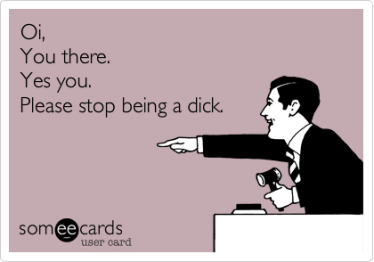After beating around the studio world for years (and years), I’ve met a lot of engineers and seen (and heard) a ton of different mixing styles. I’ve also gotten to watch the interactions between the artist and engineer and have noticed plenty of things. So in the spirit of crushing negativity, today we’re going to talk about three easy ways to make your clients never want to come back to you again. Want to keep the artist happy? Don’t do these:
1. Act like you’re the star.
 For some reason, the mixing/engineering world has an overabundance of overconfidence. Maybe it’s the feeling of being master over all the expensive gear. Or getting to touch all the buttons whenever you want (damn, that part is so much fun). Confidence is good…but walking around thinking the client is lucky to get to work with you…that is not.
For some reason, the mixing/engineering world has an overabundance of overconfidence. Maybe it’s the feeling of being master over all the expensive gear. Or getting to touch all the buttons whenever you want (damn, that part is so much fun). Confidence is good…but walking around thinking the client is lucky to get to work with you…that is not.
In case your head is in the clouds on a high-and-mighty trip, let me bring you back down to Earth. You are lucky to have your clients. The band is willing to spend their hard earned cash (and believe me, in the current music scene, every dollar is hard earned) on the skills you have to offer. This is a service business and you are there to serve. I’m not suggesting that you have nothing special to offer. You are an artist in your own right and there must be mutual respect. But keep in mind that the respect is mutual and that you need to treat the artist/band/singer with genuine gratitude for choosing you over everyone else.
2. Act as if your first mix is a take-it-or-leave-it situation.
 The first mix you supply to the band may be the best mix you’ve ever done. You really raised the bar and the music world is about to bow down to you due to your ridiculous skills.
The first mix you supply to the band may be the best mix you’ve ever done. You really raised the bar and the music world is about to bow down to you due to your ridiculous skills.
BUT. The band has some changes they’d like to make. That delay that you love on the vocal in the 2nd chorus…yeah, they don’t like it. They want it gone.
“Gasp! How could they not like that?! It’s freaking perfect and I spent an hour on it! Screw them, it stays whether they like it or not.“
Listen, I get it. You get emotionally attached to your work. How could you not be? You’ve dumped hours into it and it might very well be the best thing you’ve ever done. But the name on the front cover of the album is the only one that matters. Your name will be buried in the inside back panel credits. It took me a long time to stop taking requested mix changes so personally. I viewed each mix as a masterpiece. The problem was…they were my masterpieces. Not the band’s.
The band is the one who wrote the tunes (in most cases at least), slaved over the arrangement, practiced their asses off, and will be the ones to tour behind this album. This album means way more to their lives than it does to yours. Offer your opinions, wisdom, and sound arguments…but at the end of the day, get it to sound how they want it to sound.
3. Shut down mix critiques as “wrong” or “not possible”.
 Saying “you can’t do that” or “that won’t sound good” before trying out an idea is a good way to shut down the open and free creative environment that a good album needs to have. The first few years I started engineering professionally, I caught myself trying to shoot down ideas before they were even fully realized. After all, I was the “expert” right? So I should know what’s best?
Saying “you can’t do that” or “that won’t sound good” before trying out an idea is a good way to shut down the open and free creative environment that a good album needs to have. The first few years I started engineering professionally, I caught myself trying to shoot down ideas before they were even fully realized. After all, I was the “expert” right? So I should know what’s best?
Nope. This is a collaboration and it should be treated as such. Let’s say the bass player thinks it would be cool to pan his bass hard right in the bridge. It is very, very easy to instantly say, “well, the bass holds down the foundation in the middle and if you pan it hard right then blah blah blah…”. Don’t invalidate his idea before you give it a shot. Maybe it will suck. Maybe it will suck but it will lead to another cool idea that no one would have thought of otherwise. Or who knows, maybe the song could really use a hard panned bass in the bridge.
Try out your client’s ideas and don’t make him feel dumb for suggesting anything. Maybe his fourth “dumb” idea is amazing and makes you look like a mix genius. If you shoot him down on “dumb” idea number one, he’ll stop making suggestions and your mix won’t benefit at all.
All in all and above all else, remember the number one rule of being a mix engineer that keeps his clients happy: Don’t be a douche.
